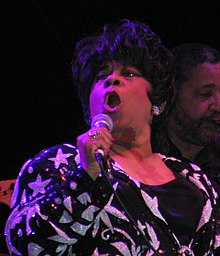Portal:Rhythm and blues
Introduction

Rhythm and blues, frequently abbreviated as R&B or R'n'B, is a genre of popular music that originated within the African-American community in the 1940s. The term was originally used by record companies to describe recordings marketed predominantly to African Americans, at a time when "rocking, jazz based music ... [with a] heavy, insistent beat" was becoming more popular. In the commercial rhythm and blues music typical of the 1950s through the 1970s, the bands usually consisted of a piano, one or two guitars, bass, drums, one or more saxophones, and sometimes background vocalists. R&B lyrical themes often encapsulate the African-American history and experience of pain and the quest for freedom and joy, as well as triumphs and failures in terms of societal racism, oppression, relationships, economics, and aspirations.
The term "rhythm and blues" has undergone a number of shifts in meaning. In the early 1950s, it was frequently applied to blues records. Starting in the mid-1950s, after this style of music had contributed to the development of rock and roll, the term "R&B" became used in a wider context. It referred to music styles that developed from and incorporated electric blues, as well as gospel and soul music. By the 1970s, the term "rhythm and blues" had changed once again and was used as a blanket term for soul and funk. (Full article...)
Selected article
Modern Sounds in Country and Western Music is a studio album by American rhythm and blues and soul musician Ray Charles, released in April 1962 on ABC-Paramount Records, in both mono and stereo format, ABC-410 and ABCS-410. Recording sessions for the album took place in early to mid-February 1962 at Capitol Studios in New York City and at United Recording Studios in Hollywood. The album features country, folk and western standards covered and redone by Charles in popular song forms of the time, such as jazz and R&B, as well as production by himself and renown conductor Sid Feller.
As his fifth LP release for ABC-Paramount, Modern Sounds in Country and Western Music became a rapid critical and commercial success as it brought Ray Charles further mainstream notice, following his tenure for Atlantic Records. With the help of the album's four charting singles, Charles earned recognition in the pop market, as well as airplay on both R&B and country radio stations. Modern Sounds and its lead single, "I Can't Stop Loving You", were both certified gold in sales by the Recording Industry Association of America on July 19, 1962, as each record had sold half a million copies in the United States.
Regarded by many music writers and critics as Charles' greatest studio effort, Modern Sounds in Country and Western Music has been included on several publications' "best album" lists in disparate genres, as well as R&B and country music lists, respectively. Modern Sounds has also been considered as a landmark album in American music, as Charles' integration of soul and country bended racial barriers in music, amid the height of the civil rights struggle. In the process of recording the album, Charles became one of the first black musicians to exercise complete artistic control over his own recording career. In October 1988, Modern Sounds was reissued on compact disc by Rhino Entertainment. In 2003, the album was ranked number 104 on Rolling Stone magazine's list of the 500 greatest albums of all time.
Topics
Featured Articles

Featured articles: "Baby Boy" · "Déjà Vu" · "Halo" · "Irreplaceable" · Janet Jackson · Michael Jackson · Mariah Carey · Sly & the Family Stone · Sons of Soul · The Supremes · Thriller · The Way I See It
Good articles: Afrodisiac · "Burn" · "Caught Up" · Christina Milian · Confessions · "Forgive Me" · FutureSex/LoveSounds · "Get Me Bodied" · "Green Light" · House of Music ·I Want You · LeToya Luckett · Let's Get It On · "Lose My Breath" · Maxwell's Urban Hang Suite · Modern Sounds in Country and Western Music · "My Boo" · My World · "Naughty Girl" · Nina Simone · Off the Wall · "Ring the Alarm" · Soul Food Taqueria · There's a Riot Goin' On · "Untitled (How Does It Feel)"· Voodoo · "We Belong Together" · "What Goes Around.../...Comes Around" · Winter in America · "Yeah!"
WikiProjects
Selected biography -
Franklin Joseph Lymon (September 30, 1942 – February 27, 1968) was an American rock and roll/rhythm and blues singer and songwriter, best known as the boy soprano lead singer of the New York City-based early rock and roll doo-wop group The Teenagers. The group was composed of five boys, all in their early to mid-teens. The original lineup of The Teenagers, an integrated group, included three African-American members, Lymon, Jimmy Merchant, and Sherman Garnes; and two Puerto Rican members, Joe Negroni and Herman Santiago. The Teenagers' first single, 1956's "Why Do Fools Fall in Love", was also their biggest hit. After Lymon went solo in mid-1957, both his career and that of The Teenagers fell into decline. In 1968, Lymon was found dead at the age of 25 on the floor of his grandmother's bathroom from a heroin overdose. Lymon was posthumously inducted into the Rock and Roll Hall of Fame in 1993 as a member of the Teenagers. His life was dramatized in the 1998 film Why Do Fools Fall in Love. (Full article...)
General images -
Related portals
Subcategories
Associated Wikimedia
The following Wikimedia Foundation sister projects provide more on this subject:
-
Commons
Free media repository -
Wikibooks
Free textbooks and manuals -
Wikidata
Free knowledge base -
Wikinews
Free-content news -
Wikiquote
Collection of quotations -
Wikisource
Free-content library -
Wikiversity
Free learning tools -
Wiktionary
Dictionary and thesaurus
Things to do
|
Sources
- ^ "Ruth Brown, the Queen of R&B, was born 93 years ago today". Frank Beacham's Journal. Archived from the original on January 24, 2021. Retrieved 2021-01-18.















































